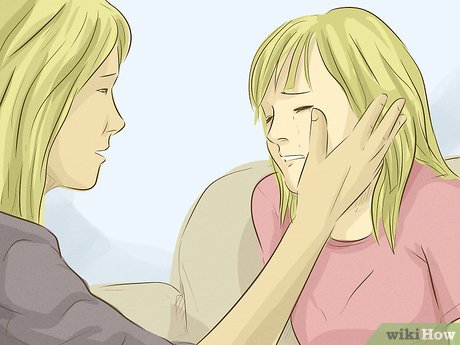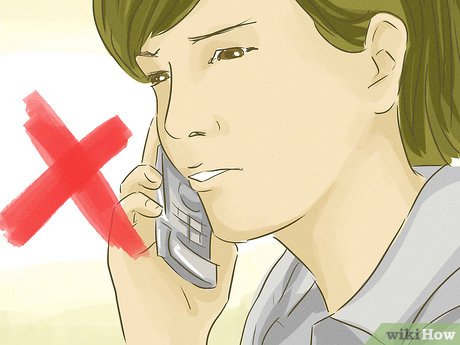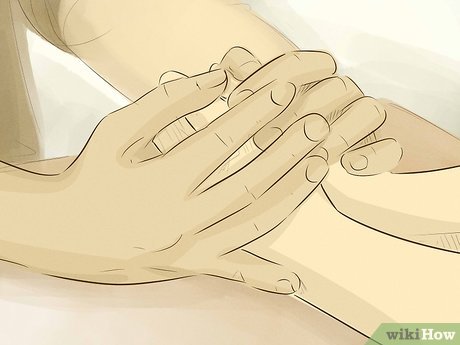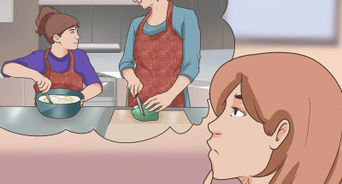Being estranged from your adult son or daughter can be extremely painful. Repairing a relationship is possible, but it takes time and will require patience. As the parent to your son or daughter, recognize that the first steps to repair the relationship fall on you to try to initiate contact, whether or not you believe you did anything wrong to cause the estrangement. Honor the boundaries your adult child has set with regards to your relationship and do not push back against them, but set your own boundaries as well. Learn to accept your adult child for who they are, and acknowledge their independence and ability to make their own choices.
Reaching Out to Your Child
-
 1Be clear on what went wrong. Before you attempt to reconnect with your child, it may be helpful to find out why your adult child is upset or angry with you. You may be able to get the information directly from your child, or you may need to find out from someone else who knows the situation. In order to mend fences, find out the problem first.[1]
1Be clear on what went wrong. Before you attempt to reconnect with your child, it may be helpful to find out why your adult child is upset or angry with you. You may be able to get the information directly from your child, or you may need to find out from someone else who knows the situation. In order to mend fences, find out the problem first.[1]- Once you have a sense of what has gone wrong, you will have some time to think through your next steps, and what you want to communicate to your son or daughter.
- Reach out to your adult child and ask. You could say, “Renee, I know you aren’t speaking to me right now, and I would like to know what I have done to hurt you. Could you please let me know? It’s okay if you don’t want to talk to me, but please write or email. I can’t fix the problem if I don’t know what it is.”
- If you do not hear a response from your son or daughter, you could get in touch with another family member or mutual friend who might know what’s going on. You could say, “Jack, have you talked to your sister lately? She’s not speaking to me, and I can’t find out what the problem is. Do you know what’s going on?”
- While discovering the reason behind the estrangement would be optimal, be aware that you may not be able to find out what is going on. However, don’t let that stop you from pursuing reconnecting with your child.
-
 2Do some self-reflection. Spend some time thinking about the reasons behind the estrangement. Was it triggered by something from the past? Has there recently been a huge change of life that caused the rift (such as a death in the family, or a birth of a child)? Perhaps you even refused to communicate with your child for a period of time, and now find your child unwilling to communicate with you.
2Do some self-reflection. Spend some time thinking about the reasons behind the estrangement. Was it triggered by something from the past? Has there recently been a huge change of life that caused the rift (such as a death in the family, or a birth of a child)? Perhaps you even refused to communicate with your child for a period of time, and now find your child unwilling to communicate with you.- Keep in mind that many adult children become estranged from their parents because of their parents’ broken marriage. Children from a broken marriage experienced their parents prioritizing their happiness over the needs of the child (even if the divorce was for the best). Often, in these types of situations parents may speak badly about the other parent not realizing that their children are absorbing everything that is being said. This can have a drastic negative effect on the type of relationship an adult child may have with their parents. Especially, if there was was one parent that had little to no contact during the child’s upbringing. Adult children of divorce may be dealing with the pain of feeling like a low priority to their parents.
-
 3Put the ball in your own court. Whether you have done anything wrong or not, parents are generally the ones who have to take the first steps toward reconciling with their estranged children. Look past the unfairness of the issue and leave your ego behind. If you want to reconnect with your child, know that you will need to be the one to reach out…and continue reaching out.[2]
3Put the ball in your own court. Whether you have done anything wrong or not, parents are generally the ones who have to take the first steps toward reconciling with their estranged children. Look past the unfairness of the issue and leave your ego behind. If you want to reconnect with your child, know that you will need to be the one to reach out…and continue reaching out.[2]- Whether your child is fourteen or forty, they still want to know that they are loved and valued by their parents. A way to show you love and value them is that you are willing to fight for your relationship. Keep this in mind if you struggle with the unfairness of the burden of work it takes to reconnect.
-
 4Contact your child. While you may want to meet with them in person right away, it may feel less intrusive to your son or daughter if you reach out via phone call, email, or letter. Honor their need for distance and give them the opportunity to respond at the time of their choosing. Be patient and allow a few days for your child’s response.
4Contact your child. While you may want to meet with them in person right away, it may feel less intrusive to your son or daughter if you reach out via phone call, email, or letter. Honor their need for distance and give them the opportunity to respond at the time of their choosing. Be patient and allow a few days for your child’s response.- Rehearse what you want to say before making a phone call. Be prepared to leave a voicemail, too. You could say, “Tommy, I would really like for us to get together to talk about how you’re feeling. Would you be willing to meet with me sometime?”
- Send an email or text message. You could write something like, “I understand you’re dealing with a lot of pain right now, and I am so sorry that I have hurt you. When you are ready, I hope you would be willing to meet with me to talk about it. Please let me know when you are. I love and miss you.”
-
 5Write a letter. Your child may be unwilling to meet with you. If that’s the case, you could decide to write them a letter. Apologize for the hurt you’ve caused, and acknowledge that you understand why they feel the way they do.
5Write a letter. Your child may be unwilling to meet with you. If that’s the case, you could decide to write them a letter. Apologize for the hurt you’ve caused, and acknowledge that you understand why they feel the way they do.- Writing a letter can be therapeutic for you, too. It clarifies your feelings and helps you regulate your emotions. Plus, you can take as much time as you need to get your words just the way you want them.[3]
- Suggest that the two of you meet when they are ready. You could write, “I know you are upset right now, but I hope that, in the future, we can get together and talk about this. My door is always open.”
-
 6Accept limits they set. Your adult child may be open to communicating with you, but not be ready for a face-to-face meeting (and may never be). They may only want to email you or talk on the phone. Avoid guilt-tripping your child while keeping the door open for future encounters down the road.
6Accept limits they set. Your adult child may be open to communicating with you, but not be ready for a face-to-face meeting (and may never be). They may only want to email you or talk on the phone. Avoid guilt-tripping your child while keeping the door open for future encounters down the road.- If you are in an email-only relationship with your adult child, you could write, “I’m very happy that we are communicating via email these days. I hope we can get to the point where we feel comfortable reconnecting in person, but no pressure.”
Having a First Conversation
-
 1Arrange for a meeting. If your adult child is willing to talk with you in person, get together in a public place for a meal. Sharing a meal in public is a good idea, as you will be more likely to hold your emotions in check, and sharing a meal with someone is an act of building community.[4]
1Arrange for a meeting. If your adult child is willing to talk with you in person, get together in a public place for a meal. Sharing a meal in public is a good idea, as you will be more likely to hold your emotions in check, and sharing a meal with someone is an act of building community.[4]- Make sure it is just the two of you meeting. Do not bring your spouse or other supportive person along. It may give your son or daughter the sense that they are being ganged up on.
-
 2Let your adult child lead the conversation. Listen to your child’s concerns without arguing against them or becoming defensive. They may also come to your meeting expecting an apology right away. If you sense that is the case, do so.[5]
2Let your adult child lead the conversation. Listen to your child’s concerns without arguing against them or becoming defensive. They may also come to your meeting expecting an apology right away. If you sense that is the case, do so.[5]- It may be helpful to start off your meeting with an apology to let your adult child know that you understand that you caused them pain, and give them a sense of “leveling the playing field.” Once you apologize, you could ask your child to tell you more about what they have been feeling.
-
 3Listen to your child without judgment. Remember that their point of view is valid, even if you disagree with it. Healing can occur when a person feels listened to and understood, and you remain open to their perspective.[6]
3Listen to your child without judgment. Remember that their point of view is valid, even if you disagree with it. Healing can occur when a person feels listened to and understood, and you remain open to their perspective.[6]- Listening without judgment and defensiveness allows a person to be honest in their responses. What you hear may be extremely hurtful to you, but understand that your child probably needs to say it and get their feelings out.
- You could say, “I feel so terrible that I made you feel this way, and I want to understand. Can you tell me more?”
-
 4Shoulder your share of the blame. Understand that you can’t get far in reconciliation without acknowledging how you may have contributed to problem. Adult children want their parents to take responsibility for their actions. Be willing to do so, whether or not you believe you are/were wrong.[7]
4Shoulder your share of the blame. Understand that you can’t get far in reconciliation without acknowledging how you may have contributed to problem. Adult children want their parents to take responsibility for their actions. Be willing to do so, whether or not you believe you are/were wrong.[7]- While you may not understand why your son or daughter is upset with you, recognize that they are. Don’t try to defend your behavior. Listen instead, and apologize for causing them pain.[8]
- Try to understand where your child is coming from. Showing empathy doesn’t mean you agree with someone, just that you understand their perspective. Understanding their perspective is an important part of resolving conflict.[9]
- You could say, “I know I pushed you a lot growing up. I wanted you to be successful. But I can understand how you thought that I was never happy with you. That is not at all what I intended, and it is not at all true. But I can see how my behavior made you think that.”
-
 5Avoid discussing your feelings about the estrangement. While it may seem unfair, now is not the time to bring up your sadness and pain around not being able to communicate with your child. Recognize that they needed some space to deal with their emotions and sort some things out. Bringing up your feelings of sadness, anger, and resentment may make your adult child feel like they are being guilt-tripped, and they may feel less likely to re-enter into a relationship.
5Avoid discussing your feelings about the estrangement. While it may seem unfair, now is not the time to bring up your sadness and pain around not being able to communicate with your child. Recognize that they needed some space to deal with their emotions and sort some things out. Bringing up your feelings of sadness, anger, and resentment may make your adult child feel like they are being guilt-tripped, and they may feel less likely to re-enter into a relationship.- You could say something like, “I’ve missed talking to you, but I know sometimes you need to take some space.”
- Do not say anything like, “I’ve been so depressed that you haven’t called me” or “Do you know the agony that I have been through, not hearing from you?”
-
 6Apologize. A good apology must clearly name what you did wrong (so that the listener knows you understand), express remorse, and offer to make amends in some way. Offer your son or daughter a heartfelt apology that acknowledges the pain you have caused them. Remember, apologize even if you believe your actions to be correct. The point is now about your child’s pain, not whether someone is right or wrong.[10]
6Apologize. A good apology must clearly name what you did wrong (so that the listener knows you understand), express remorse, and offer to make amends in some way. Offer your son or daughter a heartfelt apology that acknowledges the pain you have caused them. Remember, apologize even if you believe your actions to be correct. The point is now about your child’s pain, not whether someone is right or wrong.[10]- You could say, “Tina, I’m so sorry I hurt you so badly. I know you had to deal with a lot when I was drinking. I feel terrible that I made so many mistakes in your childhood. I understand you wanting to keep your distance from me, but I hope we can work through it.”
- Do not make any attempts to justify your action when apologizing, even if you believe you have a legitimate excuse for the action you took. For example, “I’m sorry I slapped you five years ago, but I did it because you talked back to me,” is not an apology and puts the other person on the defensive.
- Remember that an effective, genuine apology apologizes for your action rather than someone else’s reaction. For example, “I’m sorry that my behavior hurt you,” is an effective apology. “I’m sorry if you got hurt,” is not. Never use “if” in an apology.[11]
-
 7Consider family therapy. If your adult child is willing, you may wish to seek out family therapy together in order to discuss your feelings in the presence of a trained professional. A marriage and family therapist will guide family members to identify dysfunctional family behaviors and develop their own solutions to a problem. Family therapy also works to acknowledge and enhance the connections family members have with each other.[12]
7Consider family therapy. If your adult child is willing, you may wish to seek out family therapy together in order to discuss your feelings in the presence of a trained professional. A marriage and family therapist will guide family members to identify dysfunctional family behaviors and develop their own solutions to a problem. Family therapy also works to acknowledge and enhance the connections family members have with each other.[12]- Family therapy is generally short-term and focuses on one problem plaguing the family. You or your child may be encouraged to see a therapist separately to focus on individual concerns.
- To find a marriage and family therapist, you could ask your family doctor for recommendations, ask your community resource center or health department, or look online for a therapist near you.
Respecting and Establishing Boundaries
-
 1Start slowly. Resist the urge to jump back into a relationship. In most cases, a broken relationship won’t mend overnight. Depending on whether the root cause of the estrangement is mild or severe, it could take weeks, months, or even years to return to “normal.” You may also find a new normal.[13]
1Start slowly. Resist the urge to jump back into a relationship. In most cases, a broken relationship won’t mend overnight. Depending on whether the root cause of the estrangement is mild or severe, it could take weeks, months, or even years to return to “normal.” You may also find a new normal.[13]- Keep in mind that you may need to have several hard conversations about the estrangement as both of you process your feelings. It is unlikely that you will have just one conversation, and then everything will be back the way it was.
- Increase contact slowly. Meet your child alone in public places at first. Don’t invite them to loaded family events, like holiday parties, unless they seem ready and willing to attend.
- You could say, “We’d love to have you join us at Thanksgiving, but I completely understand if you don’t want to. No hard feelings if you don’t, I know you need to take your time.”
-
 2Recognize that your child is an adult. Your child is now an adult, capable of making their own decisions. You may not agree with some of their decisions, but you need to let your adult child be independent and live their own life. Meddling in your adult child’s life may have caused your child to put some distance between the two of you.[14]
2Recognize that your child is an adult. Your child is now an adult, capable of making their own decisions. You may not agree with some of their decisions, but you need to let your adult child be independent and live their own life. Meddling in your adult child’s life may have caused your child to put some distance between the two of you.[14]- Don’t offer unsolicited advice. Resist the urge to fix your child’s life and let them make their own mistakes.
-
 3Avoid giving parenting advice. Parents can be easily upset by outside parenting advice, however well-intentioned it was meant to be. Do not offer your opinion unless asked. You’ve already raised your children, now give the next generation a chance to raise theirs.[15]
3Avoid giving parenting advice. Parents can be easily upset by outside parenting advice, however well-intentioned it was meant to be. Do not offer your opinion unless asked. You’ve already raised your children, now give the next generation a chance to raise theirs.[15]- Let your child know that you will respect and defer to their parenting values and wishes. For example, if your grandchildren are limited to an hour of TV a day, let their parents know that you will abide by that rule in your house as well, or ask them first if it the rule needs to be broken.
-
 4Seek counseling for yourself. Dealing with an estranged child can be a very stressful, painful event in your life. It may be worth seeking out a qualified mental health professional to help you deal with your emotions and develop effective communication and coping strategies.[16]
4Seek counseling for yourself. Dealing with an estranged child can be a very stressful, painful event in your life. It may be worth seeking out a qualified mental health professional to help you deal with your emotions and develop effective communication and coping strategies.[16]- You may wish to find a therapist who specializes in family issues. Keep in mind, however, that your individual therapist may refer you to a different therapist if you would like to have you and your child work out your issues with a counselor present. This is so the counselor can remain objective.
- You may also be able to find assistance in online support group forums. You will be able find other people dealing with similar issues, and can talk through your problems and share success stories.
-
 5Be persistent, but not overbearing. If your son or daughter is refusing to respond to your attempts to communicate, keep trying. Send cards, write emails, or leave voicemails, letting them know you are thinking about them and want to talk.[17]
5Be persistent, but not overbearing. If your son or daughter is refusing to respond to your attempts to communicate, keep trying. Send cards, write emails, or leave voicemails, letting them know you are thinking about them and want to talk.[17]- Make sure you give the person some space, however, and respect their need for privacy and distance. Contact them no more frequently than once a week, and reduce contact if you find out that your adult child finds this intrusive. But continue to stay in touch.
- You could say, “Hi, Marisa, just wanted to say a quick hello and let you know I was thinking about you. I hope you’re doing well. I miss you. You know you can come to me whenever you want to talk. I love you.”
- Don’t try to visit them. Acknowledge their boundaries and keep up with less intrusive forms of contact.
-
 6Let go if necessary. Your adult child may see even your less intrusive attempts at getting in touch as overstepping boundaries and being too much. They may still not want to have anything to do with you, even if you have apologized and acknowledged your actions. In that case, it may be best to come to a place of acceptance for the sake of your own mental health, and step back from pursuing a relationship.
6Let go if necessary. Your adult child may see even your less intrusive attempts at getting in touch as overstepping boundaries and being too much. They may still not want to have anything to do with you, even if you have apologized and acknowledged your actions. In that case, it may be best to come to a place of acceptance for the sake of your own mental health, and step back from pursuing a relationship.- Put the ball in your child’s court. Send a note or leave a voicemail that says something like, “Peter, I understand that you want me to stop contacting you. Though it upsets me, I will respect that and will not contact you after this. If you ever want to reconnect, I will be here, but I will honor your wishes and not be in touch again. I love you.”
- Keep in mind that reconciliation may be difficult in cases of substance abuse, mental illness, or an unhealthy relationship in your child’s marriage/partnership (for example, your child is married to a controlling spouse). Your estrangement may only be the result of these problems, but you may not be able to do anything about it until your child addresses these underlying issues.
- If your child requests no contact at all, consider finding a therapist to help you work through your grief. This is difficult terrain to navigate, and you may find yourself needing additional support.
Accepting Who They Are
-
 1Accept that your child sees life from a different perspective. You all may have lived in the same house and spent most of your days together, but one person’s perception of a situation could still be completely different than another’s. Acknowledge that your adult child’s recollection or perspective is just as valid as yours.
1Accept that your child sees life from a different perspective. You all may have lived in the same house and spent most of your days together, but one person’s perception of a situation could still be completely different than another’s. Acknowledge that your adult child’s recollection or perspective is just as valid as yours.- A person’s view of the situation may be totally different based on age, the power dynamic, or closeness of relationships. For example, moving to a new city may have been great for you, but your children may have struggled because they had no choice but to tag along.[18]
- Separate realities are a part of family life. For example, when you were a child, your parents may have taken you to a museum. Their memory of the day may be of interesting exhibits and a fun family outing. You may remember being too hot in your coat and that the dinosaur skeletons scared you. Neither your or your parents’ recollection is invalid, they are just different points of view.[19]
-
 2Accept each other’s differences. You may be estranged because one, the other, or both of you do not approve of the other’s life choices. While you may not be able to do much about your child’s attitude toward you, you can show your child that you accept them for who they are, no matter what.[20]
2Accept each other’s differences. You may be estranged because one, the other, or both of you do not approve of the other’s life choices. While you may not be able to do much about your child’s attitude toward you, you can show your child that you accept them for who they are, no matter what.[20]- Take steps to show your child your change of heart. For example, if your child is gay, and you belong to a conservative congregation, find a congregation that is more liberal and accepting.
- You could let your child know that you are reading a certain book to try to understand their point of view.
- If your child is not speaking to you because they disapprove of your life choices, it will be more difficult. Be firm and confident in who you are, and keep showing them you love them. Do your best to keep communicating with them and looking for opportunities to see them.
-
 3Respect their right to disagree with you. You don’t have to change your opinions or beliefs, just refrain from showing disrespect for theirs. You can disagree with someone and still respect and love them. Not everyone’s opinion needs to be the same.[21]
3Respect their right to disagree with you. You don’t have to change your opinions or beliefs, just refrain from showing disrespect for theirs. You can disagree with someone and still respect and love them. Not everyone’s opinion needs to be the same.[21]- Honor their differences of opinion as best you can. If you are religious and your adult child is an atheist, for example, you could decide to skip church the weekend they are visiting.
- Find different topics of conversation than your contentious issues. If your adult child starts to engage you in conversation on topics that have made you argue in the past, you could say, “Will, let’s agree to disagree on this for right now. I think the only thing we do when we talk about this is upset each other.”
Conversation Help
References
- ↑ http://greatergood.berkeley.edu/article/item/how_parents_can_start_to_reconcile_with_their_kids
- ↑ http://greatergood.berkeley.edu/article/item/how_parents_can_start_to_reconcile_with_their_kids
- ↑ http://theweek.com/articles/611124/unexpected-benefits-writing-letters
- ↑ http://www.deseretnews.com/article/865606087/Defusing-the-family-feud-Steps-to-repairing-strained-or-broken-relationships.html
- ↑ http://www.deseretnews.com/article/865606087/Defusing-the-family-feud-Steps-to-repairing-strained-or-broken-relationships.html
- ↑ http://www.deseretnews.com/article/865606087/Defusing-the-family-feud-Steps-to-repairing-strained-or-broken-relationships.html
- ↑ http://greatergood.berkeley.edu/article/item/how_parents_can_start_to_reconcile_with_their_kids
- ↑ http://www.today.com/parents/parental-estrangement-silent-epidemic-cut-kids-1C9163139
- ↑ http://www.deseretnews.com/article/865606087/Defusing-the-family-feud-Steps-to-repairing-strained-or-broken-relationships.html
About This Article
Did this article help you?





















 Reaching Out to an Estranged Child
Reaching Out to an Estranged Child Reacting if an Estranged Child Reaches Out
Reacting if an Estranged Child Reaches Out Establishing Boundaries with an Estranged Child
Establishing Boundaries with an Estranged Child




















-max_bytes(150000)-strip_icc()/elizabeth-mcgrory-1000-0dcae19a0c394bc18ebb137312c17247-resize-357-357-ssl-1.jpg?ssl=1)
-max_bytes(150000)-strip_icc()-format(webp)/questions-590b68a03df78c9283acf4bc-w-840-ssl-1.jpg?ssl=1)
-max_bytes(150000)-strip_icc()-format(webp)/holdinghands-590b6bd83df78c9283ad0648-w-840-ssl-1.jpg?ssl=1)
-max_bytes(150000)-strip_icc()-format(webp)/memory-590b6d225f9b586470a9b886-w-840-ssl-1.jpg?ssl=1)
-max_bytes(150000)-strip_icc()-format(webp)/teeth-590b6e1f5f9b586470a9c277-w-840-ssl-1.jpg?ssl=1)
-max_bytes(150000)-strip_icc()-format(webp)/smile-590b6f8e3df78c9283ad2f76-w-840-ssl-1.jpg?ssl=1)
-max_bytes(150000)-strip_icc()-format(webp)/bucket-590b70f15f9b586470a9d3d8-w-840-ssl-1.jpg?ssl=1)




